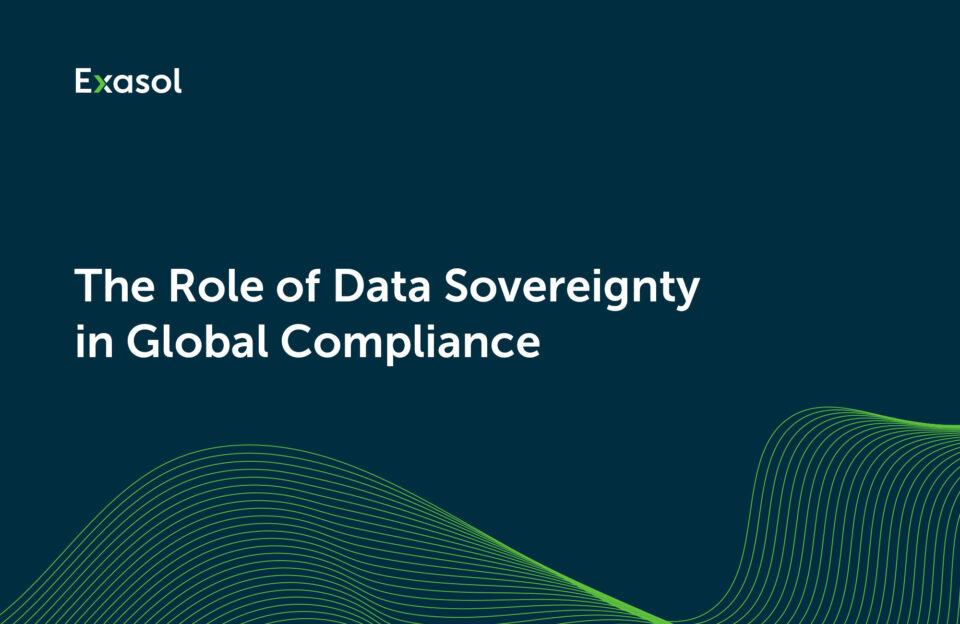
The Role of Data Sovereignty in Global Compliance

Why does it matter where your data lives? In a world of constant cyber threats, international regulations, and cloud-based workflows, understanding data sovereignty policies is no longer optional; it’s essential. For companies operating globally, knowing where data is stored and which laws apply affects everything from global compliance, data protection, to competitiveness.
We’ve already explored how a data sovereignty revolution is reshaping the future of digital infrastructure. In this article, we’ll dive deeper into how sovereignty impacts global compliance, influences international data transfers, and why it’s a pillar of trust in today’s digital economy.
What Is Data Sovereignty And Why Should You Care?
At its core, data sovereignty means your digital data is governed by the laws of the country where it’s stored or processed. But in today’s interconnected world, that simple idea quickly becomes complex.
Consider the GDPR. It enforces strict data privacy rules and limits international data transfers unless certain safeguards are in place. Even if your company is headquartered outside the EU, you may still be subject to its compliance requirements if you’re handling EU customer data.
Beyond avoiding penalties, businesses that demonstrate a strong commitment to data protection and data security earn greater customer trust, especially as awareness around data breach risks grows.
Data Residency vs. Data Ownership: Know the Difference
Two terms often confused with data sovereignty are data residency and data ownership:
- Data residency focuses on the physical location of your data. It has direct implications for regulatory compliance and data access rules.
- Data ownership is about control—who can use, modify, share, or delete data. It’s a strategic concern with legal and ethical implications.
For example, storing customer data in Germany (residency) but allowing a U.S.-based vendor to manage it (ownership) can complicate both compliance and data privacy practices. Organizations must navigate these layers carefully to meet data sovereignty policies and maintain accountability.
How Data Sovereignty Impacts Global Compliance
Regulatory compliance isn’t a set-it-and-forget-it exercise—it’s an ongoing process, especially for companies working across borders. Laws like Brazil’s LGPD, India’s Digital Personal Data Protection Act, and Canada’s PIPEDA each define their own data protection rules, including where and how data should be stored.
What does this mean for global businesses? You need flexible systems that support regional laws without disrupting operations. Companies that adapt quickly can turn compliance requirements into a competitive edge, building faster, safer, and more trusted operations.
Privacy Laws Are Driving the Push
From GDPR in Europe to China’s PIPL and California’s CCPA, privacy laws are reshaping how businesses collect, store, and share data. These frameworks often require:
- Clear user consent before data collection
- Data portability options for individuals to transfer their personal data
- Limited data access permissions within organizations
- Strong cybersecurity protocols to prevent unauthorized use or disclosure
The pressure isn’t just legal—it’s cultural. Customers increasingly expect companies to prioritize data privacy and data protection. Businesses that lead with transparency and respect around personal data can differentiate themselves, turning privacy into a brand value.
In fact, a 2024 Cisco survey revealed that 75% of consumers say they wouldn’t buy from a company they don’t trust with their data. This growing demand makes integrating data sovereignty policies and strong data governance a smart, future-proof strategy.
Building Infrastructure with Sovereignty in Mind
True data sovereignty isn’t just about where data lives—it’s about how your infrastructure is built to handle it.
Modern organizations need cloud strategies that balance data protection, regulatory compliance, and operational agility. That means designing architectures that:
- Support regional deployment without creating silos
- Enable fast, compliant data access across borders
- Protect sensitive data with strong cybersecurity defenses
- Facilitate data portability to meet changing user expectations
Rigid systems that only focus on storage location will eventually fall behind. The next generation of digital infrastructure must be flexible, intelligent, and sovereignty-ready, ensuring that companies can move data securely, adapt to new regulations, and innovate without barriers.
At Exasol, we see sovereignty-driven infrastructure not as a constraint but as a catalyst for better performance and smarter scalability. It’s about putting data where it can deliver the most value—responsibly, securely, and strategically—while staying fully aligned with global compliance requirements.
Organizations that embrace this mindset are building the foundations of the future digital economy, where sovereignty, speed, and intelligence go hand in hand.
Data Localization vs. Cross-Border Data Flows
As nations assert more control over digital assets, data localization laws are becoming more common. Countries like Russia, India, and China require that certain categories of data, especially personal or sensitive data, be stored on servers located within their borders.
Meanwhile, international data transfers are vital for enabling global collaboration, cloud services, and e-commerce. Restrictions on these transfers can create operational bottlenecks if not handled carefully.
Key Challenges Businesses Face:
- Ensuring regulatory compliance while using global cloud platforms
- Managing costs associated with maintaining local data centers
- Designing architectures that allow both localized storage and secure international data flows
Solutions Emerging:
- Regionalized cloud strategies, where data is stored and processed close to where it is collected
- Enhanced encryption and security protocols to safeguard data access during transfers
- Clear contracts with cloud providers specifying data residency and compliance guarantees
The goal is to respect data sovereignty policies without slowing down innovation—a delicate but essential balance.
Understanding the Risks of Poor Compliance
Failing to respect data sovereignty laws doesn’t just risk fines—it exposes companies to much deeper operational and reputational risks:
- Data breaches that violate local regulations can lead to multi-million-dollar penalties (e.g., GDPR fines up to 4% of annual revenue).
- Loss of customer trust and public backlash following non-compliance scandals.
- Disruption of international data transfers, impacting global operations and growth.
By proactively aligning with compliance requirements, organizations protect themselves from costly litigation and safeguard their position in global markets.
Balancing Global Compliance and Operational Flexibility
Managing compliance requirements while supporting a global business model isn’t easy. Organizations must design systems that meet data residency laws and enable necessary workflows, like cross-border analytics or support.
This is where modern data governance comes in. A clear governance strategy incorporates data privacy, data portability, and ethical principles to ensure data is handled responsibly at every stage. It also sets the foundation for scalable, compliant growth in the digital economy.
Embedding Data Ethics into Global Compliance
In addition to meeting legal standards, leading companies are weaving data ethics into their strategies. This means:
- Being transparent about how data is collected, stored, and shared
- Respecting data access and ownership rights
- Prioritizing user control and consent
- Designing systems that enable data portability and deletion at a user’s request
By proactively addressing ethical concerns around data privacy and data protection, companies foster deeper trust and loyalty, essential assets in a highly competitive, trust-driven digital economy.
The Growing Role of Data Portability in Compliance
As privacy laws evolve, data portability is becoming a core compliance expectation, not just a nice-to-have. Regulations like the GDPR explicitly grant individuals the right to move their personal data between service providers.
For businesses, enabling data portability isn’t only about offering downloads. It involves designing systems that make data easy to extract, securely transfer, and properly delete when needed. Organizations must ensure that portability mechanisms respect data sovereignty policies and align with local compliance requirements.
Companies that invest early in scalable, compliant data portability solutions can differentiate themselves by offering customers greater control, building loyalty while staying ahead of regulatory trends. It’s not just about ticking a box; it’s about future-proofing how you manage user rights in a dynamic digital economy.
Securing International Data Transfers Without Losing Agility
In a sovereignty-conscious world, international data transfers are under increasing scrutiny. Companies can no longer assume that moving data across borders is seamless; new treaties, like the EU-U.S. Data Privacy Framework, and evolving local laws demand proactive compliance.
Organizations need robust strategies that:
- Define which data can be moved and which must stay localized
- Apply encryption and tokenization to protect sensitive information in transit
- Negotiate clear data handling agreements with third-party vendors
When executed well, international data transfer strategies don’t slow a business down—they speed it up. Companies that build sovereignty-aware transfer systems maintain their global agility while demonstrating a deep commitment to data protection, data privacy, and cybersecurity standards across borders.
Rather than seeing cross-border compliance as a blocker, organizations should treat it as an opportunity to create smarter, more secure infrastructure that enhances long-term resilience.
Data Sovereignty in Multinational Companies
As global companies expand, they face a growing patchwork of regulatory compliance rules around data protection, data access, and storage. Rather than seeing these as barriers, the most agile businesses treat sovereignty as a chance to lead with transparency and trust.
A thoughtful data sovereignty approach strengthens operational resilience, builds stakeholder confidence, and unlocks new market opportunities. It becomes not just a legal necessity, but a competitive differentiator.
The Legal Maze: Challenge or Opportunity?
Navigating different countries’ laws is no small feat. But the upside? You get to build systems and policies that scale, both technically and legally.
By staying ahead of emerging compliance requirements, businesses can design workflows that are both secure and flexible. This kind of foresight turns the legal maze into an innovation driver, not a roadblock.
Why Strong Data Governance Matters
Solid data governance isn’t just about ticking boxes—it’s about making sure data is used responsibly and securely across the organization.
With proper governance, companies gain clarity around:
- Data access and permissions
- Data residency strategies
- Protocols for preventing a data breach
- Compliance with cybersecurity standards
This structured approach supports both data protection and long-term business goals, especially in industries where trust and reliability are non-negotiable.
How Data Sovereignty Can Be a Competitive Advantage
By taking data sovereignty policies seriously, businesses can differentiate themselves in the eyes of partners, regulators, and customers.
Organizations that go beyond basic compliance requirements—offering transparency, granular data access controls, and strong cybersecurity—are seen as more trustworthy and more mature. That’s a big deal in a landscape where data breaches can damage brand equity overnight.
The Benefits of Getting It Right
Companies that build their strategies around data sovereignty enjoy benefits like:
1. Stronger Security and Cyber Resilience
With clear rules around data access and storage, businesses reduce the risk of a data breach and boost their cybersecurity posture.
2. Smarter Compliance Management
When you align operations with regulatory compliance from the start, audits go smoother and risks are minimized.
3. Future-Ready Digital Transformation
Being sovereignty-aware helps companies future-proof their strategies and adapt quickly in the digital economy.
4. Optimized Cloud Strategies
By understanding which data can move—and which must stay—businesses can build smarter cloud environments that respect international data transfers while staying compliant.
Wrapping It Up
Data sovereignty is no longer just about meeting legal obligations—it’s about building trust, enabling innovation, and leading responsibly in a connected world.
Businesses that understand and embrace data protection, data privacy, and regulatory compliance aren’t just checking boxes. They’re creating a strong foundation for global success—one that keeps them resilient in the face of change and competitive in a fast-evolving digital economy.